Creating your own pregnancy-safe raspberry leaf tea blend can be a rewarding and beneficial endeavor. Start by selecting high-quality organic raspberry leaves and gather essential tools like a digital scale and airtight containers. Complement the base with pregnancy-safe herbs like peppermint or nettle leaf for added flavor and nutrients. Be mindful of safety considerations and always consult your healthcare provider before incorporating new teas into your prenatal routine. Experiment with natural sweeteners and adjust the blend for each trimester. By crafting your own blend, you'll have a personalized, nourishing beverage to enjoy throughout your pregnancy journey. The following guide will equip you with everything you need to know.
Benefits of Raspberry Leaf Tea
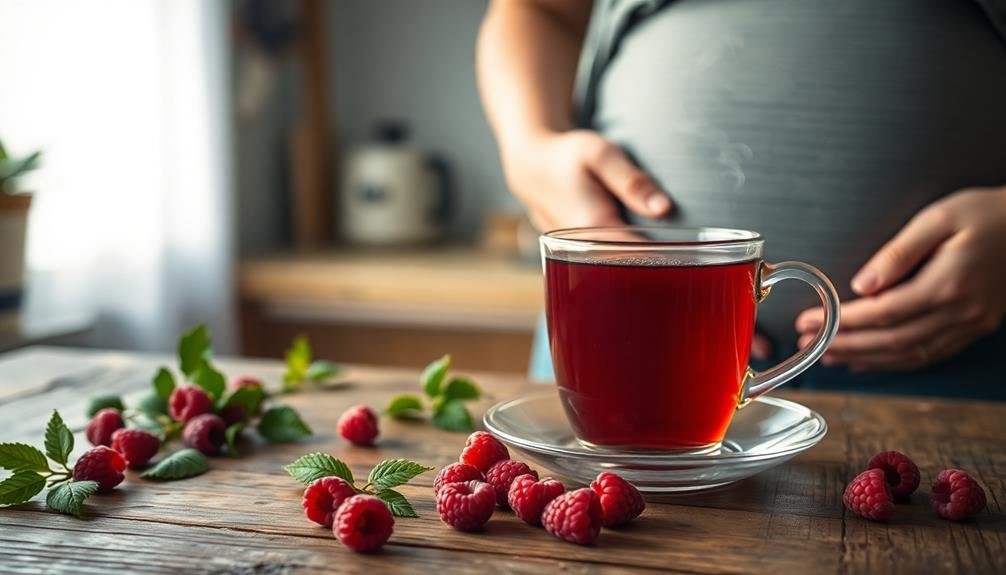
Raspberry leaf tea has gained popularity among expectant mothers for its potential pregnancy benefits. This herbal infusion is rich in vitamins and minerals, including iron, calcium, and magnesium, which can support your overall health during pregnancy.
It's believed to strengthen your uterine muscles, potentially leading to easier labor and delivery.
You'll find that raspberry leaf tea may help reduce morning sickness and nausea, common discomforts in early pregnancy. As you progress, it might alleviate leg cramps and improve sleep quality.
Some women report experiencing shorter labor times and fewer complications when consuming this tea regularly in the third trimester.
The tea's astringent properties can tone your pelvic floor muscles, potentially reducing the risk of postpartum bleeding. It's also thought to increase milk production for breastfeeding mothers.
While scientific evidence is limited, many midwives and herbalists recommend raspberry leaf tea for its potential to ease pregnancy discomforts and prepare your body for childbirth.
However, always consult your healthcare provider before adding any new herb to your pregnancy diet, as individual circumstances may vary.
Selecting Quality Raspberry Leaves

When selecting raspberry leaves for your pregnancy tea blend, you'll want to reflect on organic versus conventional options.
It's essential to source your leaves from reputable suppliers who follow proper drying techniques.
Organic vs. Conventional Options
Quality matters when it comes to selecting raspberry leaves for your pregnancy-safe tea blend. When choosing between organic and conventional options, you'll want to take into account several factors.
Organic raspberry leaves are grown without synthetic pesticides or fertilizers, which may appeal to you if you're concerned about chemical residues. They're often perceived as purer and safer for pregnancy, though scientific evidence is limited.
Conventional raspberry leaves are typically more affordable and widely available. While they may contain trace amounts of pesticides, regulatory bodies enforce strict limits to guarantee safety. If you opt for conventional leaves, look for those from reputable sources that follow good agricultural practices.
Both organic and conventional options can be effective for your tea blend. The key is to choose high-quality leaves, regardless of their cultivation method. Look for leaves that are vibrant green, free from discoloration or damage, and have a fresh, pleasant aroma.
If possible, select leaves from the current season's harvest for maximum potency. Remember, proper preparation and moderation are essential when consuming raspberry leaf tea during pregnancy.
Sourcing From Reputable Suppliers
Selecting a trustworthy supplier is just as important as choosing between organic and conventional options. When sourcing raspberry leaves for your pregnancy-safe tea blend, look for reputable companies with a track record of quality and transparency.
Check if they provide detailed information about their sourcing practices, cultivation methods, and quality control processes. Opt for suppliers who work directly with farmers or have established relationships with growers. This guarantees better control over the production and handling of the leaves.
Look for certifications such as USDA Organic, Fair Trade, or Non-GMO Project Verified, which indicate adherence to specific standards. Read customer reviews and seek recommendations from midwives or herbalists who may have experience with different suppliers.
Don't hesitate to contact the company directly with questions about their products or practices. A reputable supplier will be happy to provide information and address your concerns.
Consider purchasing from local herb farms or herbalists if possible. This allows you to see the growing conditions firsthand and build a relationship with the producer.
Alternatively, choose well-established online retailers specializing in herbs and teas, as they often have stringent quality control measures in place.
Proper Drying Techniques
The proper drying of raspberry leaves is essential for maintaining their beneficial properties and guaranteeing a safe, high-quality tea blend for pregnancy. When you're selecting leaves to dry, choose those that are free from damage, discoloration, or signs of disease. Pick the leaves in the morning after the dew has evaporated but before the sun becomes too intense.
To dry the leaves, you'll want to use a method that preserves their nutritional value. Air-drying is the most common and effective technique. Spread the leaves in a single layer on a clean, dry surface in a well-ventilated area away from direct sunlight. You can use drying racks, screens, or even hang small bundles of leaves upside down. Guarantee good air circulation to prevent mold growth.
The drying process typically takes 1-2 weeks, depending on humidity levels. You'll know the leaves are fully dried when they're crisp and crumble easily.
Store the dried leaves in airtight containers in a cool, dark place to maintain their potency. Properly dried and stored raspberry leaves can retain their beneficial properties for up to a year, providing you with a steady supply for your pregnancy-safe tea blend.
Essential Tools for Blending
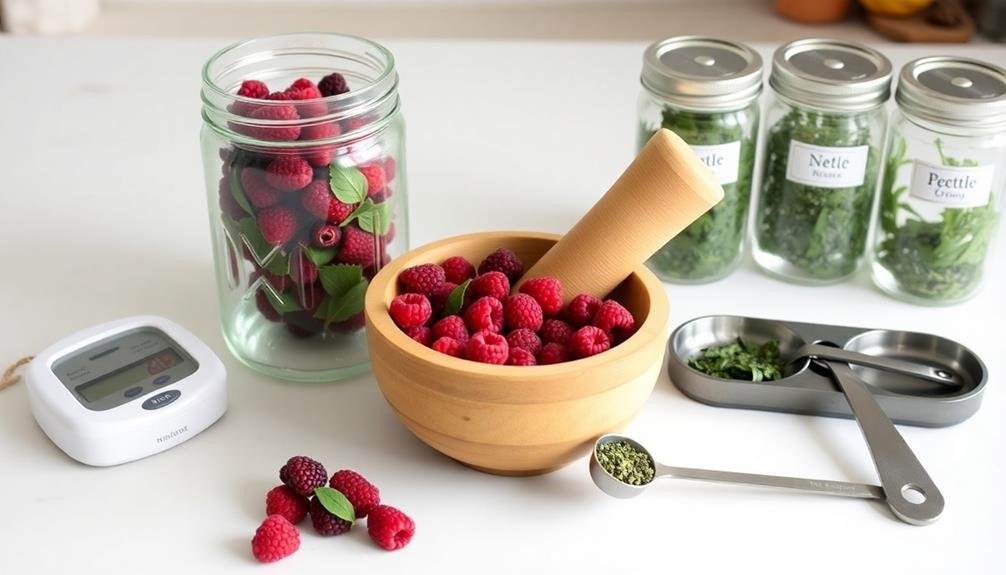
For creating your pregnancy-safe raspberry leaf tea blend, you'll need a few vital tools. First, invest in a high-quality digital scale to measure your ingredients accurately. This guarantees consistency in your blend and helps you maintain the right proportions of herbs.
A large mixing bowl is essential for combining your dried herbs. Opt for a non-reactive material like glass or stainless steel to prevent any unwanted flavors from leaching into your blend. You'll also need a sturdy wooden spoon or silicone spatula for gentle mixing without damaging delicate leaves.
To store your blend, choose airtight glass jars or tins that protect the herbs from light and moisture. Label each container with the blend's ingredients and date of creation.
For packaging individual servings, consider using biodegradable tea bags or a tea ball infuser. A mortar and pestle can be useful for crushing larger leaves or seeds, enhancing flavor extraction.
Complementary Herbs for Flavor
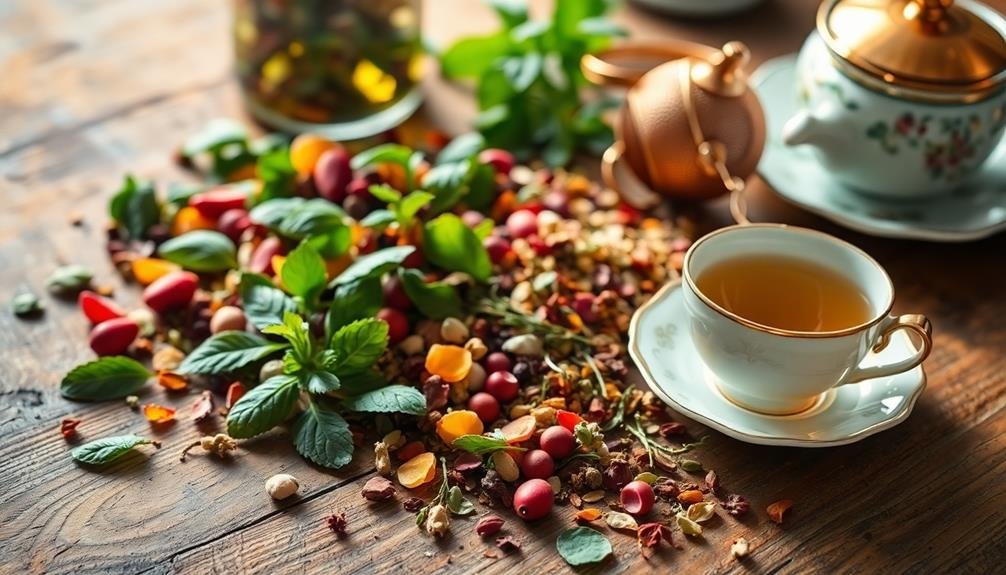
How can you enhance the flavor of your raspberry leaf tea blend while keeping it pregnancy-safe? While raspberry leaf tea is known for its health benefits during pregnancy, its taste can be somewhat bitter.
Fortunately, there are several complementary herbs you can add to improve the flavor without compromising safety.
When selecting herbs to blend with raspberry leaf, consider these pregnancy-safe options:
- Peppermint: This invigorating herb adds a cool, minty taste and can help alleviate nausea.
- Lemon balm: With its mild citrus flavor, lemon balm can brighten the overall taste of your blend.
- Nettle leaf: Rich in nutrients, nettle leaf has a subtle earthy flavor that pairs well with raspberry leaf.
- Rose hips: These add a slightly tart, fruity flavor and are packed with vitamin C.
Remember to use these herbs in moderation and consult with your healthcare provider before incorporating new herbs into your pregnancy diet.
Start with small amounts of each herb and adjust to your taste preferences. You'll want to maintain raspberry leaf as the primary ingredient while using these complementary herbs to create a more enjoyable and flavorful tea blend.
Balancing Flavors in Your Blend
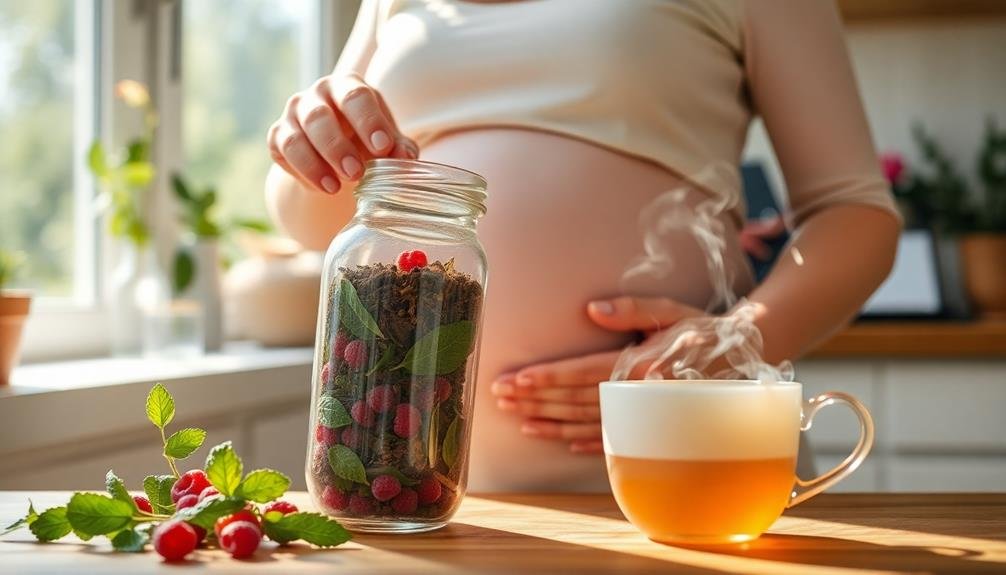
When creating your pregnancy-safe raspberry leaf tea blend, you'll want to contemplate complementary herb pairings to enhance the flavor profile.
You can experiment with combinations like raspberry leaf and peppermint for a revitalizing taste, or raspberry leaf and chamomile for a soothing blend.
If you're looking to add sweetness without sugar, contemplate natural options like stevia leaves or a touch of dried fruit, such as apple or strawberry.
Complementary Herb Pairings
To create a well-balanced raspberry leaf tea blend, think about pairing it with complementary herbs that enhance both flavor and potential benefits.
These carefully selected additions can transform your tea into a more enjoyable and potentially beneficial beverage during pregnancy.
When choosing complementary herbs, focus on those that are generally deemed safe for pregnancy and offer unique flavors or properties.
Here are four excellent options to think about:
- Peppermint: This invigorating herb can help alleviate nausea and provide a cooling sensation. It pairs well with raspberry leaf, adding a pleasant minty flavor to your blend.
- Lemon balm: Known for its calming properties, lemon balm can help reduce stress and anxiety. Its mild citrusy notes complement the earthy taste of raspberry leaf.
- Nettle leaf: Rich in nutrients, nettle leaf can support overall health during pregnancy. It has a subtle, grassy flavor that blends seamlessly with raspberry leaf.
- Rose hips: High in vitamin C, rose hips add a tangy, slightly sweet flavor to your blend. They can help boost your immune system and provide a vibrant color to your tea.
Sweetening Without Sugar
While these herb pairings can enhance the flavor of your raspberry leaf tea blend, some may find the taste still needs a little sweetening. If you're looking to add sweetness without using sugar, there are several natural alternatives you can try. These options not only add a pleasant taste but also offer additional health benefits during pregnancy.
Here's a comparison of sugar-free sweeteners you can use in your raspberry leaf tea blend:
| Sweetener | Taste Profile | Benefits |
|---|---|---|
| Stevia | Very sweet, slight aftertaste | Zero calories, may help regulate blood sugar |
| Monk fruit | Sweet, no aftertaste | Zero calories, antioxidant properties |
| Raw honey | Rich, complex sweetness | Antibacterial, may help with allergies |
| Coconut sugar | Caramel-like, less sweet | Lower glycemic index than regular sugar |
| Blackstrap molasses | Bold, slightly bitter | Rich in iron and minerals |
When adding these sweeteners, start with small amounts and adjust to taste. Remember that your taste preferences may change during pregnancy, so don't be afraid to experiment. You'll find the perfect balance of flavors that satisfies your palate while keeping your raspberry leaf tea blend pregnancy-safe and delicious.
Sweeteners for Your Tea Mix
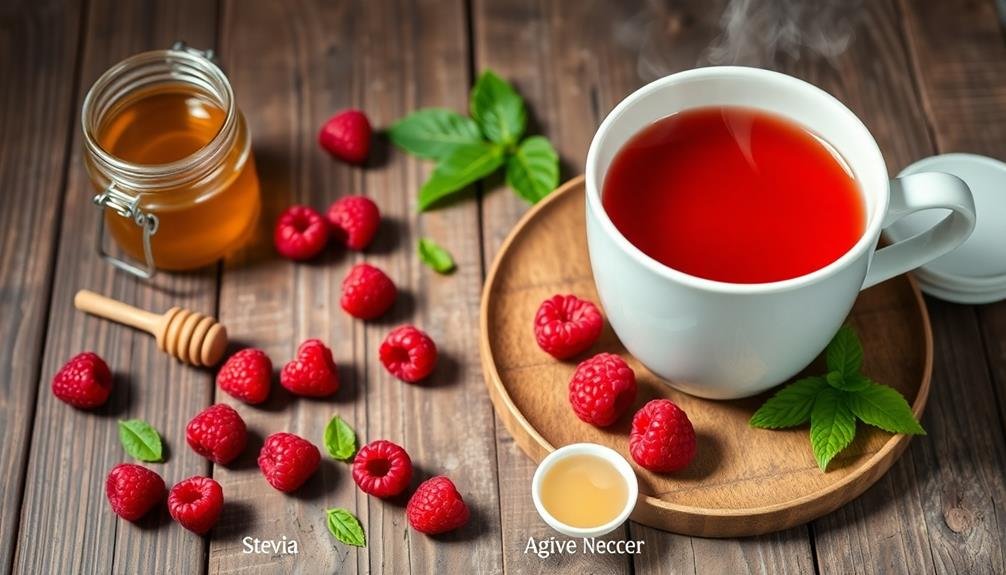
Many expectant mothers prefer to sweeten their raspberry leaf tea blend for a more enjoyable experience.
When choosing sweeteners for your pregnancy-safe tea mix, it's important to take into account options that are both safe and nutritious. Here are four excellent choices to enhance the flavor of your raspberry leaf tea:
- Raw honey: A natural sweetener packed with antioxidants and antibacterial properties. It's best to use raw, unpasteurized honey for maximum health benefits, but verify it's from a reliable source.
- Stevia: A zero-calorie, plant-based sweetener that's safe for pregnant women. It's much sweeter than sugar, so you'll need less to achieve the desired taste.
- Maple syrup: Rich in minerals and antioxidants, pure maple syrup adds a distinct flavor to your tea. Opt for 100% pure maple syrup without additives.
- Coconut sugar: A low-glycemic alternative to regular sugar, it contains trace minerals and provides a subtle caramel flavor.
When adding sweeteners to your raspberry leaf tea blend, start with small amounts and adjust to taste.
Measuring and Proportions Guide
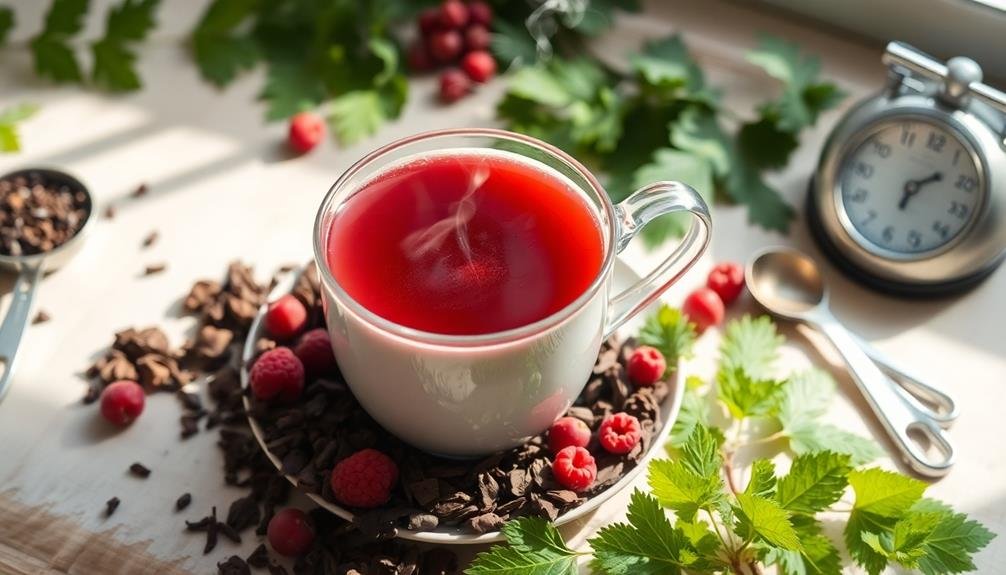
Now that you've chosen your sweeteners, let's focus on getting the right measurements for your pregnancy-safe raspberry leaf tea blend. Proper proportions are essential for creating a balanced and effective tea mix. Start with a base of 1 cup of dried raspberry leaves, then add complementary herbs and sweeteners according to your taste preferences.
Here's a guide to help you measure and combine ingredients:
| Ingredient | Amount per 1 cup of raspberry leaves |
|---|---|
| Peppermint | 1-2 tablespoons |
| Nettle | 1-2 tablespoons |
| Sweetener | 1-2 teaspoons |
Remember, these measurements are guidelines. You can adjust them to suit your taste. For a stronger flavor, increase the amount of herbs. If you prefer a milder taste, reduce the quantities. When measuring, use level spoonfuls for accuracy.
To prepare your tea, steep 1-2 teaspoons of your blend in 8 ounces of hot water for 5-10 minutes. It's best to start with a weaker brew and gradually increase the strength as your pregnancy progresses. Always consult your healthcare provider before adding new herbs to your diet during pregnancy.
Drying and Storing Ingredients
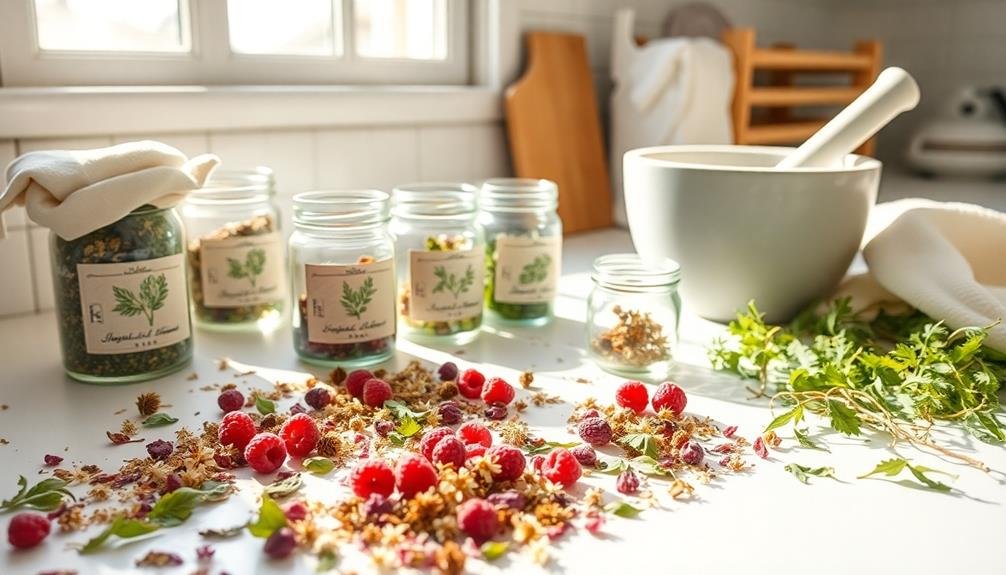
Proper drying and storage of your tea ingredients is vital for maintaining their flavor, potency, and safety. When you've gathered your herbs, it's important to dry them correctly before blending. Spread the leaves on a clean, dry surface in a well-ventilated area away from direct sunlight. Allow them to air dry for several days until they're crisp and crumbly.
Once your herbs are thoroughly dried, it's time to store them properly. Here's a quick guide:
- Use airtight containers: Glass jars or tin containers work best to keep moisture and air out.
- Label clearly: Mark each container with the herb name and date of storage.
- Store in a cool, dark place: A pantry or cupboard away from heat sources is ideal.
- Check regularly: Inspect your stored herbs every few weeks for signs of mold or moisture.
When stored correctly, most dried herbs can last up to a year. However, it's best to use them within six months for best flavor and potency.
Steeping Techniques for Best Results

With your ingredients dried and stored, it's time to focus on the art of steeping your pregnancy-safe raspberry leaf tea blend. To extract the maximum benefits and flavor, use water that's just below boiling point, around 200°F (93°C). This temperature helps preserve the delicate compounds in the herbs while ensuring proper extraction.
For a single cup, use 1-2 teaspoons of your blend per 8 ounces of water. If you're making a larger batch, adjust accordingly. Place the herbs in a tea infuser or directly in your teapot. Pour the hot water over the herbs and cover immediately to trap the steam and essential oils.
Let the tea steep for 5-10 minutes, depending on your desired strength. Avoid steeping for longer than 15 minutes, as this can lead to a bitter taste. If you prefer a stronger brew, add more herbs rather than increasing steeping time.
After steeping, remove the herbs and enjoy your tea. You can drink it hot or let it cool to room temperature. For a revitalizing iced version, steep the tea stronger than usual and pour it over ice.
Remember to consult your healthcare provider about the appropriate frequency and dosage during pregnancy.
Customizing for Different Trimesters
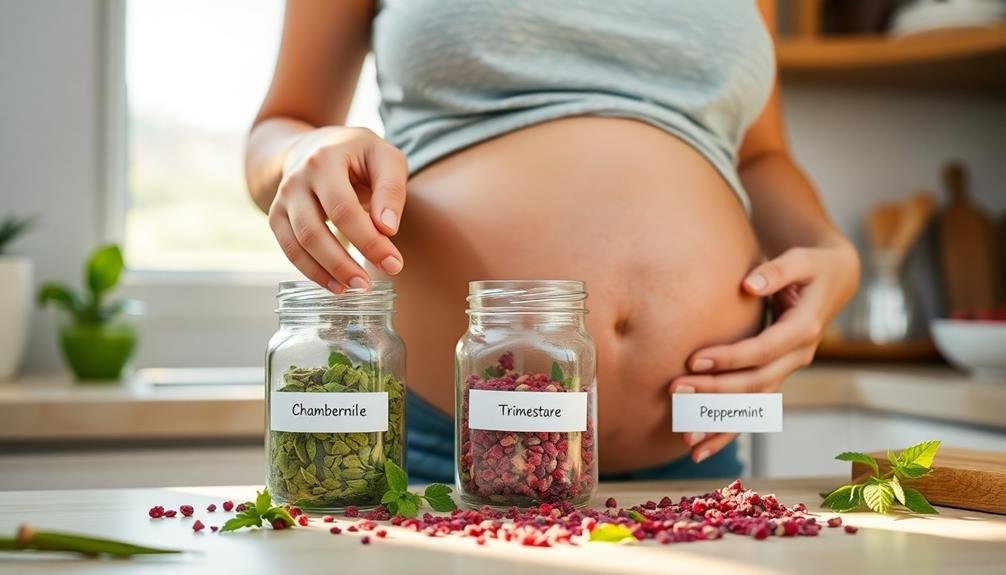
As you journey through pregnancy, you'll want to adjust your raspberry leaf tea blend to suit each trimester.
In the first trimester, you might consider a milder blend with less raspberry leaf, while the second trimester allows for a gradual increase in strength.
First Trimester Considerations
The first trimester marks a crucial period in pregnancy, and it's important to approach raspberry leaf tea with caution during these early weeks.
While some healthcare providers recommend avoiding raspberry leaf tea altogether during the first trimester, others suggest gradually introducing it in small amounts. If you're considering incorporating this tea into your early pregnancy routine, consult your healthcare provider first.
When creating your raspberry leaf tea blend for the first trimester, keep these considerations in mind:
- Start with a weak brew, using only a small amount of dried raspberry leaves.
- Limit consumption to no more than one cup per day.
- Monitor your body's response closely for any adverse reactions.
- Consider blending raspberry leaf with other pregnancy-safe herbs like ginger or peppermint.
Remember that every pregnancy is unique, and what works for one person may not be suitable for another.
If you experience any unusual symptoms or discomfort after drinking raspberry leaf tea, discontinue use immediately and consult your healthcare provider.
As you progress through your pregnancy, you can gradually increase the strength and frequency of your tea consumption, always keeping in mind your body's individual needs and responses.
Second Trimester Adjustments
Entering the second trimester often brings a sense of relief for many expectant mothers. As you move into this stage, you can start to increase your raspberry leaf tea consumption gradually. Begin with one cup per day and slowly work your way up to two cups daily by the end of the second trimester. This gradual approach helps your body adjust to the tea's effects.
During this trimester, you might want to take into account adding other pregnancy-safe herbs to your blend. Nettle leaf can provide additional iron and calcium, while peppermint can help with nausea that may still linger.
Lemon balm is another excellent addition, known for its calming properties and potential to reduce stress.
Remember to listen to your body and adjust your tea blend accordingly. If you experience any discomfort or unusual symptoms, reduce your intake or consult your healthcare provider.
As you prepare for the third trimester, you'll want to make sure your blend is optimized for the final stages of pregnancy. Keep track of how different herbs affect you, and don't hesitate to experiment with various combinations to find what works best for your body and taste preferences.
Third Trimester Preparations
During the third trimester, you'll want to increase your raspberry leaf tea consumption to prepare for labor. This is when you'll reap the most benefits from this herbal blend.
As you approach your due date, consider these adjustments to your tea routine:
- Gradually increase your intake to 2-3 cups per day, starting at 32 weeks.
- Add nettle leaf to your blend for its high mineral content and blood-building properties.
- Incorporate a small amount of chamomile to promote relaxation and reduce stress.
- Consider including a pinch of ginger to help with any lingering nausea or digestive discomfort.
Remember to listen to your body and consult your healthcare provider before making significant changes to your tea blend.
Some women find that raspberry leaf tea helps strengthen uterine muscles and potentially shorten labor duration. However, it's important to recognize that while this tea can support your body's preparations, it won't induce labor on its own.
As you sip your customized blend, focus on staying hydrated and nourished. This tea can be a comforting ritual during the final weeks of pregnancy, helping you feel more prepared for the upcoming birth experience.
Safety Considerations During Pregnancy
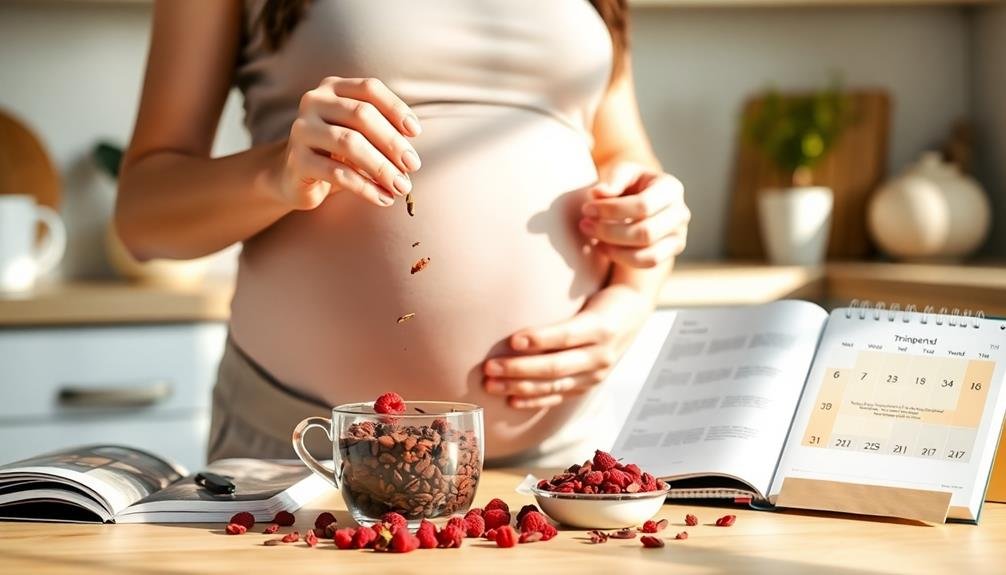
While raspberry leaf tea is generally considered safe for most pregnant women, it's crucial to consult your healthcare provider before incorporating it into your prenatal routine. They'll consider your individual health status and any potential risks.
When brewing your own blend, make sure you're using high-quality, organic ingredients to avoid exposure to pesticides or contaminants. Be cautious about combining raspberry leaf with other herbs, as some may not be pregnancy-safe. Stick to reputable sources for your tea ingredients and avoid untested or unfamiliar herbs.
Start with a weak brew and gradually increase the strength, paying attention to how your body responds. If you experience any unusual symptoms, such as strong Braxton Hicks contractions or abdominal pain, discontinue use immediately and contact your healthcare provider.
Remember that moderation is key. Even with pregnancy-safe teas, excessive consumption can lead to unwanted side effects. Limit your intake to 1-2 cups per day, especially in the first trimester.
As you approach your due date, you may increase consumption slightly, but always follow your healthcare provider's recommendations.
Batch Preparation and Storage
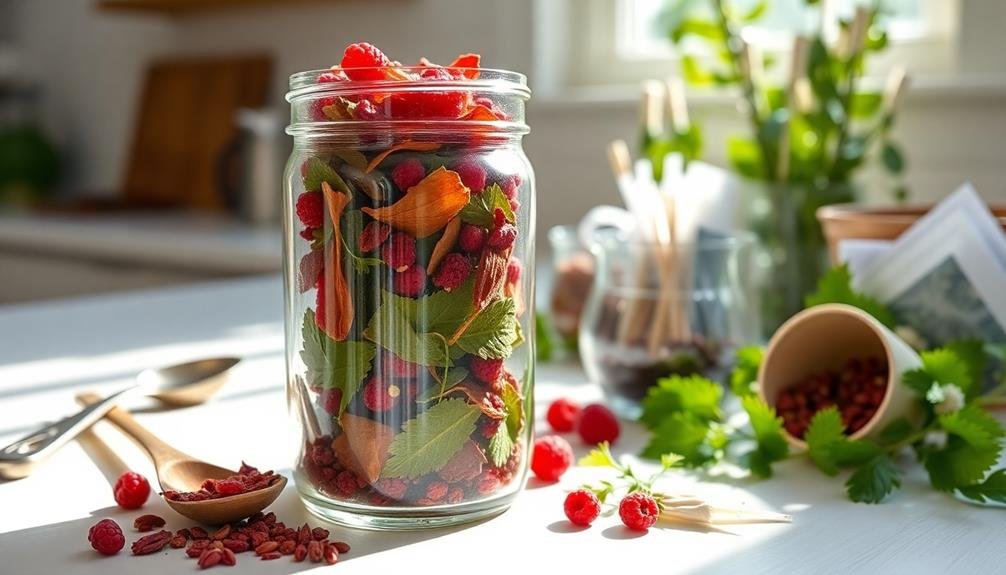
Now that you're familiar with the safety considerations, let's focus on preparing and storing your raspberry leaf tea blend efficiently.
To create a batch that'll last you a few weeks, you'll need to measure and mix your ingredients in larger quantities. Use a clean, dry bowl to combine your chosen herbs, making certain they're well-blended.
Once you've mixed your tea blend, it's essential to store it properly to maintain its freshness and potency. Follow these steps for ideal storage:
- Choose an airtight container: Use a glass jar or tin with a tight-fitting lid to keep moisture and air out.
- Label your blend: Clearly mark the container with the blend's ingredients and date of preparation.
- Store in a cool, dark place: Keep your tea away from direct sunlight and heat sources to preserve its quality.
- Use within 3-6 months: While dried herbs can last longer, it's best to consume your blend within this timeframe for best flavor and benefits.
When you're ready to brew, simply measure out the desired amount of your pre-mixed blend and steep according to the recipe's instructions.
This batch preparation method will save you time and guarantee consistency in your daily tea routine.
Gifting Your Custom Tea Blend
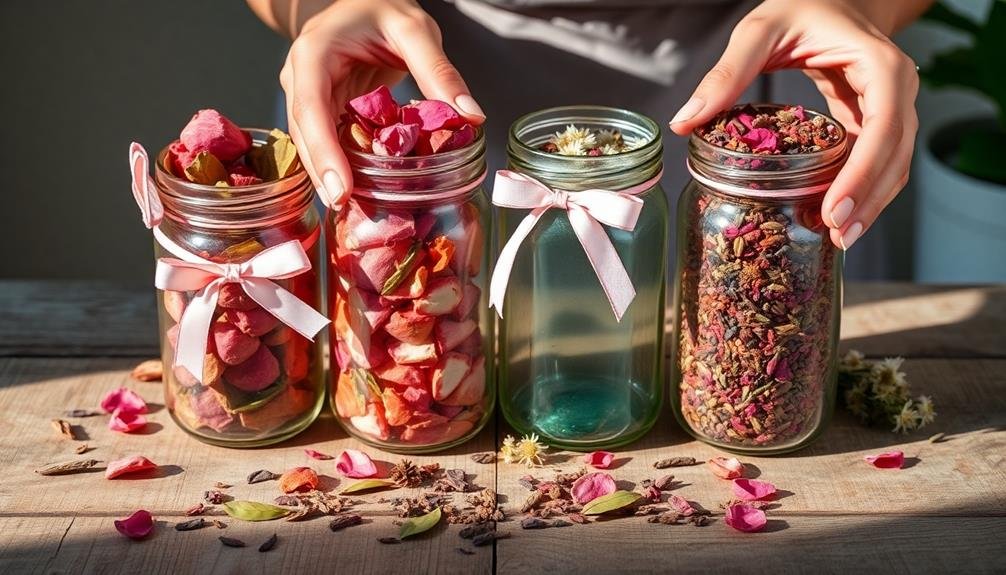
Your custom pregnancy-safe raspberry leaf tea blend makes a thoughtful and unique gift for expectant mothers. Package your blend in attractive tins or resealable bags, adding a personalized label with the ingredients and brewing instructions. Consider including a small tea infuser or disposable tea bags for convenience.
To make your gift even more special, create a themed gift basket. Include items like:
| Tea Accessories | Pregnancy Comforts | Self-Care Items |
|---|---|---|
| Ceramic mug | Pregnancy pillow | Unscented lotion |
| Honey dipper | Compression socks | Aromatherapy candle |
| Tea strainer | Ginger candies | Relaxation music CD |
When presenting your gift, share information about the benefits of raspberry leaf tea during pregnancy and any personal experiences you've had with it. Emphasize that while generally considered safe, it's essential for the recipient to consult their healthcare provider before consuming the tea.
Remember to include a note with your gift, expressing your well wishes and support for the mom-to-be. Your thoughtful, handcrafted tea blend will not only provide potential health benefits but also show your care and consideration during this special time in her life.
Incorporating Tea Into Daily Routine
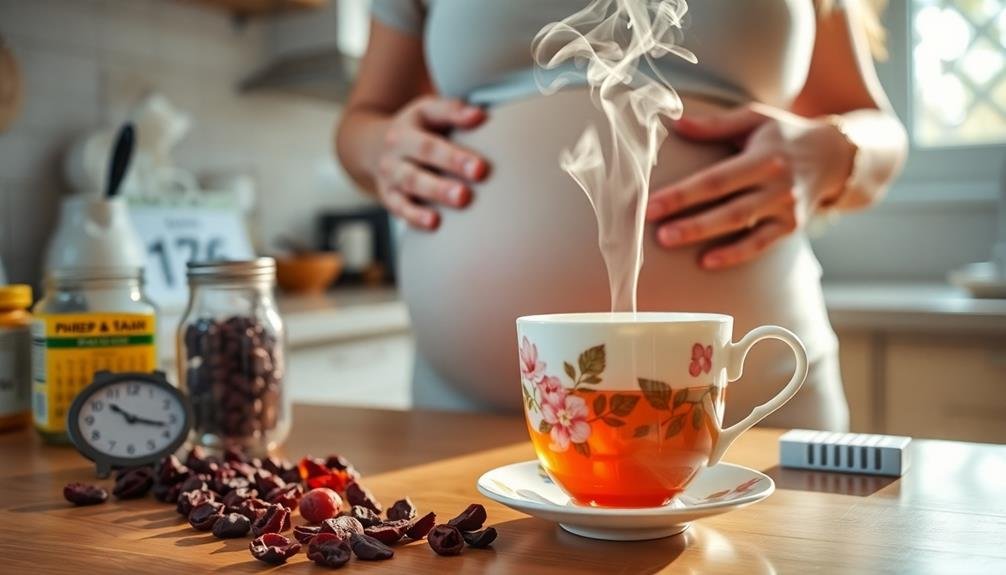
Incorporating a pregnancy-safe raspberry leaf tea blend into your daily routine can be both enjoyable and beneficial. To make the most of your custom tea, consider establishing a consistent tea-drinking schedule. Many expectant mothers find it helpful to start their day with a warm cup, while others prefer to sip throughout the afternoon or wind down in the evening.
To seamlessly integrate your tea blend into your daily life:
- Set a reminder on your phone or smartwatch to brew your tea at specific times.
- Keep your tea supplies easily accessible in your kitchen or office for quick preparation.
- Use a travel mug to take your tea on-the-go, ensuring you don't miss out when you're busy.
- Pair your tea-drinking with other relaxing activities, such as reading or gentle stretching.
Remember to stay hydrated by drinking plenty of water alongside your tea. If you're sensitive to caffeine, consider brewing your blend in the morning or early afternoon to avoid potential sleep disruptions.
As you progress through your pregnancy, you may find that adjusting your tea consumption helps address changing needs and preferences.
Frequently Asked Questions
Can Raspberry Leaf Tea Induce Labor?
While raspberry leaf tea won't directly induce labor, it may help tone your uterus and prepare your body for childbirth. It's often used in the third trimester, but you should consult your healthcare provider before consuming it.
How Does Raspberry Leaf Tea Affect Breastfeeding?
When you're breastfeeding, raspberry leaf tea may increase your milk supply. It's generally considered safe, but you should consult your healthcare provider first. Be aware that it might affect your baby through breast milk.
Are There Any Known Drug Interactions With Raspberry Leaf Tea?
You should be cautious when drinking raspberry leaf tea with certain medications. It may interact with some blood thinners, diabetes drugs, and hormone therapies. Always consult your doctor before consuming it if you're taking any medications.
Can Men Drink Raspberry Leaf Tea for Health Benefits?
Yes, you can drink raspberry leaf tea for potential health benefits. It's not just for women. You'll find it may support digestive health, boost immunity, and provide antioxidants. However, consult your doctor before adding it to your routine.
Is It Safe to Drink Raspberry Leaf Tea While Trying to Conceive?
You can safely drink raspberry leaf tea while trying to conceive. It's known to support reproductive health and may enhance fertility. However, consult your doctor before consuming it regularly, as individual health conditions can vary.
In Summary
You've now learned how to create your own pregnancy-safe raspberry leaf tea blend. Remember to always consult your healthcare provider before adding new herbs to your pregnancy diet. With your custom blend, you'll enjoy a delicious, potentially beneficial beverage tailored to your tastes. Don't forget to share your creation with expectant friends or keep it as a special treat for yourself. Embrace this opportunity to nurture your body and baby naturally.

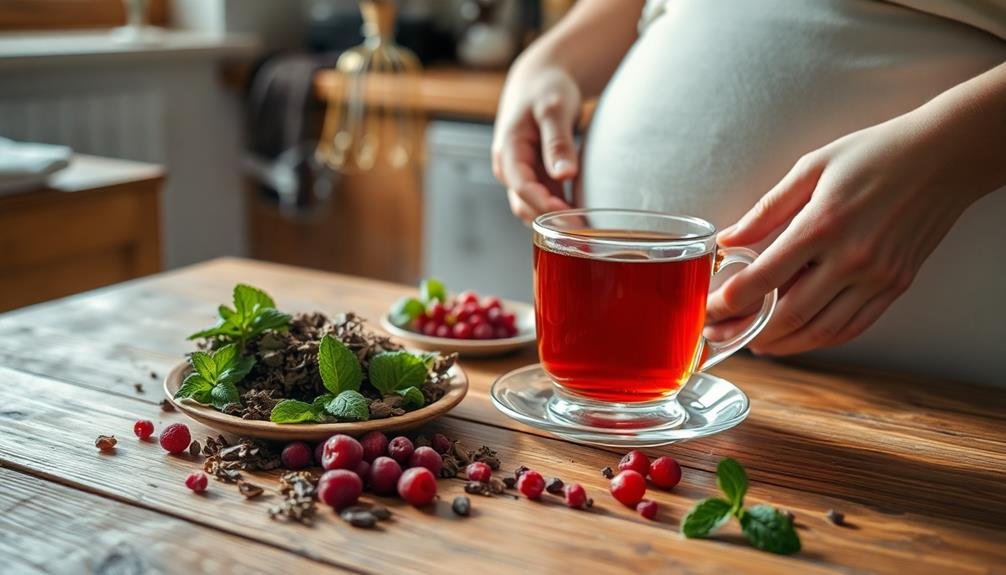



Leave a Reply